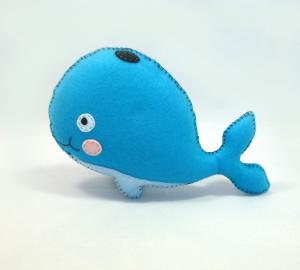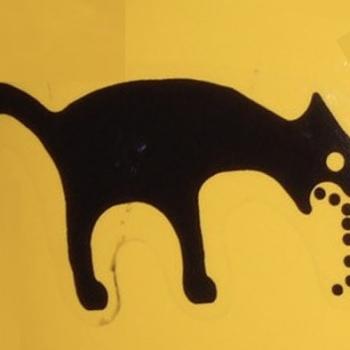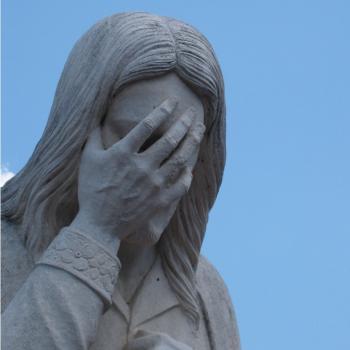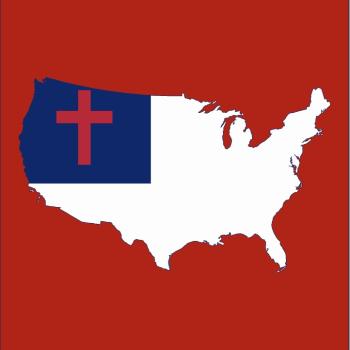We think of Jonah as that guy who sat undigested in the belly of a big fish for 3 days. But there’s more to his story. Really, the fish part may have been the high point of his life. And really, there’s something about him that’s very familiar.
Jonah’s first couple of screw-ups
In the first chapter of Jonah, of course, God commands Jonah to preach against the wicked city of Nineveh. Jonah does not walk, he runs in the opposite direction.
We’ve all felt discomfort at some point about doing our Christian duty. We’ve all politely declined God’s “suggestions” when they were too costly in time, treasure, effort, or comfort.
Jonah’s reason for running was creative, to say the least – we’ll get to that a little later.
So he hops on a ship bound for Tarshish, and God sends a violent storm. The sailors do what anyone would do in the middle of a storm at sea: they draw straws to discover who is to blame. Of course it’s Jonah.
As the waves continue crashing over the ship’s bow, the sailors ask Jonah to tell them a little about himself.
Jonah answers (all quotes are NIV), “I am a Hebrew and I worship the Lord, the God of heaven, who made the sea and the dry land” – and who sent the storm to punish Jonah for disobeying orders.
(Great job, Jonah, representing God as vindictive and his followers as idiots.)
“Pick me up and throw me into the sea,” he tells the sailors, “and it will become calm. I know that it is my fault that this great storm has come upon you.”
The (pagan) sailors are horrified at this suggestion, and at first ignore it and try to row back to shore. But when realize they’re about to die, they ask Jonah’s God not to punish them for killing Jonah, and toss him overboard.
(Is it just me, or did the pagan sailors just have more reverence for God than Jonah did?)
Here’s the famous part: “Now the Lord provided a huge fish to swallow Jonah,” and Jonah spent roughly seventy-two hours in the belly of said fish.

Jonah gets religion
Now, when all seems lost, Jonah decides to pray:
When my life was ebbing away, I remembered you, Lord, and my prayer rose to you, to your holy temple…
From deep in the realm of the dead I called for help, and you listened to my cry.
Those who cling to worthless idols turn away from God’s love for them. But I, with shouts of grateful praise, will sacrifice to you.
What I have vowed I will make good. I will say, ‘Salvation comes from the Lord.’
(We will soon see whether Jonah makes good on his fish-belly vows.)
“And the Lord commanded the fish, and it vomited Jonah onto dry land.”
(Before we continue the story, quick question: have you subscribed to my free newsletter? You should!)
Nineveh or bust
Jonah has a new lease on life, and does God have a job for him.
“Go to the great city of Nineveh and proclaim to it the message I give you,” God commands.
I can hear Jonah bellowing, “Sir, yes Sir!” and sprinting to Nineveh. There, he preaches with the newfound zeal of a man freshly puked out of a giant fish: “Forty more days and Nineveh will be overthrown.”
According to his fish-belly vow, he should also proclaim, “Salvation comes from the Lord.” But it’s more fun to talk trash – and, truth be told, after all the embarrassment this wicked city had caused him, he’s actually looking forward to its destruction.
But doggone it, the people of Nineveh believe Jonah’s message. “A fast was proclaimed, and all of them, from the greatest to the least, put on sackcloth.” Even the king humbles himself. He proclaims that all residents – including the animals – must fast and wear sackcloth (take a moment to picture a goat in sackcloth).
The king commands everyone to “call urgently on God” and “give up their evil ways and their violence” on the outside chance that God would have mercy.
Sure enough, God hears their prayers and sees their repentance – and spares the city. (Mind you, the Ninevites did not perform circumcisions or burnt offerings.)
Jonah’s hissy fits
“But to Jonah this seemed very wrong, and he became angry.”
Jonah prays again – this time with a slightly different tone than he’d taken inside the fish. He reminds God of an earlier conversation they’d had:
Isn’t this what I said, Lord, when I was still at home? That is what I tried to forestall by fleeing to Tarshish. I knew that you are a gracious and compassionate God, slow to anger and abounding in love, a God who relents from sending calamity.
You read that correctly: Jonah fled to Tarshish because he knew God would ultimately have mercy on Nineveh – and he hated that idea.
Jonah adds melodramatically, “Now, Lord, take away my life, for it is better for me to die than to live.”
Then he sits down outside the city to sulk and watch. Will God really save Nineveh, or did Jonah’s tantrum change God’s mind?
God provides a plant to grow in just the right spot to shade Jonah from the midday sun, which gives Jonah consolation. But the next morning, God sends a worm to kill off the plant, exposing Jonah to the scorching sun. In his misery he cries out again, “It would be better for me to die than to live…I’m so angry I wish I were dead.”
And God lets Jonah have it:
You have been concerned about this plant, though you did not tend it or make it grow. It sprang up overnight and died overnight. And should I not have concern for the great city of Nineveh, in which there are more than a hundred and twenty thousand people who cannot tell their right hand from their left—and also many animals?
And so ends the book of Jonah.
Here’s where the patriotic stuff comes in
4th century Bible translator and commentator Saint Jerome has some fascinating thoughts on the book and character of Jonah. As reported by author Yvonne Sherwood, Jerome viewed Jonah’s actions in a positive light (please pardon the lengthy quote):
Jerome, peering into the mechanisms of Jonah’s psyche, sees a man who feels that speaking a word to the Ninevites would be like speaking a word against the Israelites…Jonah acts thus as a patriot, not so much that he hates the Ninevites [but] because he “despairs of the safety of Israel”…
Thus Jonah becomes a nationalist in a positive sense, and stands among the noblest heroes in the biblical hall of fame (emphasis added).
Jerome is really reaching here, putting lipstick on a pig, as it were. To our modern eyes, Jonah was obviously unwilling to see non-Hebrews as equals. He knew God’s mercy and resented the idea of any other people sharing in that mercy. Today we might call him a bigot.
It is hard for some of us to imagine why someone would want to withhold God’s compassion from others – but then again, this is one of the mountains that many evangelicals would die on. (I was one of those evangelicals.)
Jesus himself taught that all God wants from us is to love sacrificially and care for the needy (tall orders, indeed), but many among us disregard these words of Jesus and focus on verses that seem to say all God wants from us is belief.
We make excuses for our failure to love “the least of these” (or even treat them humanely) because “they” are taking our jobs or crossing our border without permission. We should be inviting them in, feeding and clothing them – according to Jesus.
We call ourselves patriots when we stand for the national anthem, and criticize those who take a knee on behalf of the least of these. We should be addressing our national sins, not silencing the advocates of change.
We blame the marginalized for their adversity – perpetuating their misfortune, instead of resolving it.
We discriminate against those whom we don’t understand, judging them as sinners – while we ourselves are guilty of judgmentalism, hate, and refusing to see others as equals.
We are like Jonah when we begrudge God’s love and mercy for all people. We don’t want to share God’s grace. We care more about trifles, like guns and masks, than about loving our neighbors – all of them – as ourselves.
YOU MIGHT WANT TO CHECK OUT:
The Beatitudes: what does God require of us?
The inclusivity of heaven – according to Jesus
“When I was hungry, you handcuffed me” – see Jesus in Palestinian children
Learning to love my gay neighbor, Part One: Preface
FEATURED IMAGE: “Ben the Whale Sewing Pattern” by LittleStuff.me is licensed under CC BY 2.0













